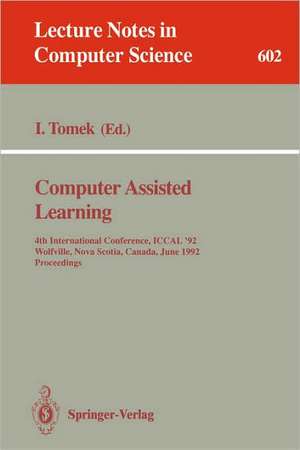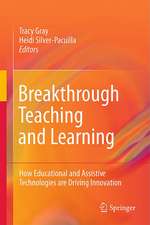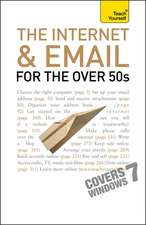Computer Assisted Learning: 4th International Conference, ICCAL '92, Wolfville, Nova Scotia, Canada, June 17-20, 1992. Proceedings: Lecture Notes in Computer Science, cartea 602
Editat de Ivan Tomeken Limba Engleză Paperback – 27 mai 1992
Din seria Lecture Notes in Computer Science
- 20%
 Preț: 1061.55 lei
Preț: 1061.55 lei - 20%
 Preț: 307.71 lei
Preț: 307.71 lei - 20%
 Preț: 438.69 lei
Preț: 438.69 lei - 20%
 Preț: 645.28 lei
Preț: 645.28 lei -
 Preț: 410.88 lei
Preț: 410.88 lei - 15%
 Preț: 580.46 lei
Preț: 580.46 lei - 17%
 Preț: 427.22 lei
Preț: 427.22 lei - 20%
 Preț: 596.46 lei
Preț: 596.46 lei -
 Preț: 449.57 lei
Preț: 449.57 lei - 20%
 Preț: 353.50 lei
Preț: 353.50 lei - 20%
 Preț: 1414.79 lei
Preț: 1414.79 lei - 20%
 Preț: 309.90 lei
Preț: 309.90 lei - 20%
 Preț: 583.40 lei
Preț: 583.40 lei - 20%
 Preț: 1075.26 lei
Preț: 1075.26 lei - 20%
 Preț: 310.26 lei
Preț: 310.26 lei - 20%
 Preț: 655.02 lei
Preț: 655.02 lei - 20%
 Preț: 580.93 lei
Preț: 580.93 lei - 20%
 Preț: 340.32 lei
Preț: 340.32 lei - 18%
 Preț: 938.83 lei
Preț: 938.83 lei - 20%
 Preț: 591.51 lei
Preț: 591.51 lei - 15%
 Preț: 438.59 lei
Preț: 438.59 lei - 20%
 Preț: 337.00 lei
Preț: 337.00 lei -
 Preț: 389.48 lei
Preț: 389.48 lei - 20%
 Preț: 607.39 lei
Preț: 607.39 lei - 20%
 Preț: 1024.44 lei
Preț: 1024.44 lei - 20%
 Preț: 579.30 lei
Preț: 579.30 lei - 20%
 Preț: 763.23 lei
Preț: 763.23 lei - 20%
 Preț: 453.32 lei
Preț: 453.32 lei - 20%
 Preț: 575.48 lei
Preț: 575.48 lei - 20%
 Preț: 585.88 lei
Preț: 585.88 lei - 20%
 Preț: 825.93 lei
Preț: 825.93 lei - 20%
 Preț: 763.23 lei
Preț: 763.23 lei - 17%
 Preț: 360.19 lei
Preț: 360.19 lei - 20%
 Preț: 1183.14 lei
Preț: 1183.14 lei - 20%
 Preț: 340.32 lei
Preț: 340.32 lei - 20%
 Preț: 504.57 lei
Preț: 504.57 lei - 20%
 Preț: 369.12 lei
Preț: 369.12 lei - 20%
 Preț: 583.40 lei
Preț: 583.40 lei - 20%
 Preț: 343.62 lei
Preț: 343.62 lei - 20%
 Preț: 350.21 lei
Preț: 350.21 lei - 20%
 Preț: 764.89 lei
Preț: 764.89 lei - 20%
 Preț: 583.40 lei
Preț: 583.40 lei - 20%
 Preț: 649.49 lei
Preț: 649.49 lei - 20%
 Preț: 341.95 lei
Preț: 341.95 lei - 20%
 Preț: 238.01 lei
Preț: 238.01 lei - 20%
 Preț: 538.29 lei
Preț: 538.29 lei
Preț: 656.74 lei
Preț vechi: 772.64 lei
-15% Nou
Puncte Express: 985
Preț estimativ în valută:
125.66€ • 131.56$ • 103.98£
125.66€ • 131.56$ • 103.98£
Carte tipărită la comandă
Livrare economică 07-21 aprilie
Preluare comenzi: 021 569.72.76
Specificații
ISBN-13: 9783540555780
ISBN-10: 3540555781
Pagini: 632
Ilustrații: XII, 620 p.
Dimensiuni: 155 x 235 x 33 mm
Greutate: 0.87 kg
Ediția:1992
Editura: Springer Berlin, Heidelberg
Colecția Springer
Seria Lecture Notes in Computer Science
Locul publicării:Berlin, Heidelberg, Germany
ISBN-10: 3540555781
Pagini: 632
Ilustrații: XII, 620 p.
Dimensiuni: 155 x 235 x 33 mm
Greutate: 0.87 kg
Ediția:1992
Editura: Springer Berlin, Heidelberg
Colecția Springer
Seria Lecture Notes in Computer Science
Locul publicării:Berlin, Heidelberg, Germany
Public țintă
ResearchCuprins
Why hypermedia systems are important.- Project CALC: Calculus as a laboratory course.- The structures of advanced multimedia learning environments: Reconfiguring space, time, story, and text.- Adjusting to the paradim shift in teaching and learning or what do I do now???.- Engagement and construction: Educational strategies for the post-TV era.- Building knowledge based tutors.- Learning styles and computer-based learning environments.- Text and graphics in instructional design.- Assessing program visualization systems as instructional aids.- At last! A computer aid for the teaching of electronics which answers all the nagging questions about capacitors.- An object oriented approach to produce educational hypermedia software.- A cognitive model of programming knowledge for procedural languages.- Programming by experimentation and example.- An experiment of cooperative learning with Hypercard.- An ITS for engineering domains concept, design and application.- Structuring the subject matter.- MIDI draw: Designing an impressionistic medium for young musicians, artists, and writers.- Standardized architecture for integrated open courseware.- Formal techniques in higher education: A proposal.- QUIZ, a distributed intelligent tutoring system.- Intelligent tutorial system in medicine through an interactive testing program: HyperMIR.- DCE: A knowledge-based tutoring and advisory system - Tutoring strategies and architecture.- Discourse style and situation viewpoint for a conversational language tutor.- Open structured CAI system for Kanji learning.- The sum of the parts is greater than the whole in online graduate education.- Development of GeoBlock: a micro-world for learning and teaching geometry.- SODA: A computer-aided design environment for the doing and learning of software design.- A graphical CAL author language.- A knowledge base approach to learning to program in Prolog.- Self-adjusting curriculum planning in Sherlock II.- Integrating an educational simulation into a Logic Design course.- An algorithm animation programming environment.- ABASE: A Hypermedia-based tutoring and authoring system.- A tool for developing intelligent tutoring systems.- Applying computer models of phonological competence to C.A.L.L..- Vigilance in a long-term cognitive computing task: The effects of subject strategy and screen colour on performance.- Mastering the machine: A comparison of the mouse and touch screen for children's use of computers.- An authoring system for ITS which is based on a generic level of tutoring strategies.- The uses of multiple student inputs in modeling and lesson planning in CAI and ICAI programs.- Project Nestor: New approaches to cooperative multimedia authoring/learning.- Design and implementation of courseware for teaching programming languages.- Objector, yet another authoring system.- Design and evaluation of the SUMIT intelligent teaching assistant for arithmetic.- Spelling remediation for dyslexic children using the selfspell programs.- Using HyperCard to create a flexible learning package for statistics: Costs, benefits and effectiveness.- Educational software engineering: A methodology based on cooperative developments.- Environmental CAL for conversation pattern learning.- Adaptive navigational tools for educational hypermedia.- A tool for storing and exploring ideas.- Dynamic CAL-courseware generation within an ITS-shell architecture.- Callguide: using programmable hypertext as a shell for Call programs.


